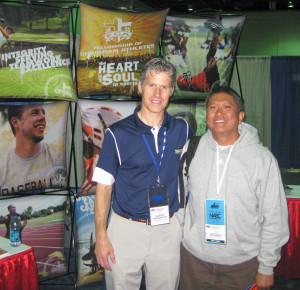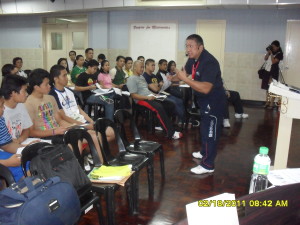In the 1970s, Swiss biologist Hermann Brandt created a game called tchoukball (pronounced “chook-ball”)—a teamwork-heavy mashup of more well-known sports, including volleyball, jai alai and handball. The goal was to allow players of all ages and walks of life to experience the thrill of competition without the aggressiveness and violence that commonly permeates athletic events.
Four decades later, tchoukball has increased so much in popularity that it now boasts junior, women’s and men’s world championships at the international level. And today, it is helping a passionate group of FCA International missionaries and partners in the Philippines reach athletes and coaches for Christ and share a love that transcends creed, culture and competition.
In 2009, FCA began an international ministry effort in partnership with Operation Mobilisation, a Christian motivational and equipping group working in more than 100 countries throughout the world. According to FCA’s Barry Spofford, who serves as national director of FCA International, a single, powerful command from God’s Word led to the groups’ shared mission.
“At the grand finale, there will be people there from every tribe, every tongue and every nation present,” Spofford said, citing Revelation 7:9. “Sports is one of the best ways to reach across cultural divides, tell people about Jesus, and show them how they can use their love of sports to build a love of God.”
Unlike believers in many nearby countries, Christians in the Philippines (a group of Southeast Asian islands in the western Pacific Ocean) are able to worship openly without the fear of persecution. Still, according to Spofford, the initial mixing of sports and religion proved foreign to locals when FCA and OM arrived. In his experience, no two international cultures have embraced the combination in the same way.
“When you are working internationally, you have to contextualize your ministry for every different environment,” he said. “We basically go in and spend time with people, just getting to know them, which allows us to begin to understand their culture. Then we’ll take our sports culture and tools and show people how they can begin to use those tools to make an impact within their own sporting communities.”
Despite its population of 90 million, many of the Philippines’ almost 7,100 islands still lack a true local church, said FCA Philippines Director Gary Visitacion. It’s a fact that allows local sports ministries—even in their relative infancy—to play vital roles in teaching Filipinos about a personal relationship with Christ.
“Originally, sports ministry efforts in the Philippines began in 1952 when a team from Indiana’s Taylor University came over to play basketball and share Jesus with the people,” said Visitacion, a retired military chaplain who also serves as president of the Philippine Tchoukball Federation. “Over the next couple of years, that became a trend. Teams would come, play and share. Over time, other mission agencies began to come to the Philippines, and local churches started developing their own sports teams. But one thing I still saw was their lack of proper training, ministry resources, and any exposure to successful sports ministry programs.”
Visitacion first dedicated his life to Christ in 1984 after attending a local basketball exhibition that featured a squad of American Christian players traveling with Venture for Victory Sports Ambassadors. It wasn’t long before he sensed the Lord calling him into ministry. He quit his job, enrolled at one of the Philippines’ top Bible seminaries, and began to pastor his fellow countrymen.

FCA Executive Vice President of International Ministry Dan Britton and Gary Visitacion at the 2008 NCAA Men's Final Four in San Antonio.
Despite his position as a pastor, Visitacion said reaching people for Christ through athletics began to take a larger presence as he prayed about ministry. In 2008, while working with Sports Ambassadors—the ministry that had been so instrumental in his faith—Visitacion traveled to the U.S. for the NCAA Men’s Final Four basketball championship. While waiting for the games to begin, the Filipino pastor wandered the concourse, where he came upon the FCA booth and soon found himself deep in conversation with Dan Britton, FCA’s executive vice president of ministry programs.
Britton introduced him to a variety of ministry personnel, including FCA President Les Steckel, and gave him an overview of the ministry. Inspired by the ministry’s vision and mission, Visitacion mentioned to Britton that he hoped the ministry would come to the Philippines. Before long, he was visiting the FCA National Support Center in Kansas City and, just two weeks later, meeting Spofford at a conference in Phoenix.
The rest, as they say, is history.
“I learned that FCA is a great organization with great resources,” Visitacion said. “FCA’s leaders gave me a lot of materials when I visited the U.S., and it got me excited about organizing coaches and athletes in ways that most local churches in my country had been unable to do as a part of their church program.”
In March 2010, Spofford traveled to the Philippines to help train and equip Visitacion and other local leaders in all things FCA. According to Visitacion, the response from local volunteers has exceeded his expectations.
“We really have strong leadership partners with FCA Philippines,” Visitacion said. “I thought I would find it hard to invite or recruit individuals to be part of our sports ministry, but God has brought us the right people. Two years later, we have a solid leadership base and have established chapters throughout the country.”
In fact, Visitacion said, the most difficult thing has been dealing with FCA Philippines’ growing popularity. Although the ministry has experienced immediate acceptance throughout the nation—thanks to steady leadership, a Christ-centered focus and solid equipping skills—the organization has had to consider finances carefully when planning camps, presentations and continual expansion.
Yet, despite FCA Philippines’ financial restraints, Visitacion said that God’s glory continues to shine as more and more Filipinos connect their love for athletics with their relationship with Christ—or discover Him for the first time.
“FCA is all about relationships,” Visitacion said. “When I introduce FCA Philippines all over the country, I experience acceptance right away, even with non-Christian schools. We’ve been able to reach thousands of coaches and athletes since we started, and some of them are now part of local churches and volunteering with us.
“I believe God has allowed FCA to be in the Philippines because of the dynamic nature of its ministry,” he continued. “The feedback I receive from coaches and athletes about FCA is that they’ve never seen resources like those available through FCA—everything is already there. FCA offers a complete sports ministry package, and sharing FCA with Filipino coaches and athletes has been a very positive experience.”

Visitacion sharing the gospel with coaches and athletes in the Philippines.
With God’s blessing, Visitacion believes FCA Philippines will continue to grow and prosper. Already their sports teams have traveled on missions to Vietnam, Singapore, Taiwan and Malaysia, and Visitacion’s vision is to increase the number of regional FCA chapters by two or three each year.
“Gary is a very intelligent, well-spoken and outstanding field leader,” Spofford said. “He’s been involved in missions for a good portion of his life, he has a strong work ethic, and we could see from the start that he was a real visionary. He’s done an outstanding job.”
Part of FCA’s strategic plan includes growing internationally by expanding ministries like FCA Philippines, equipping local coaches, athletes and volunteers as they grow in their faith and reach the world for Christ.
“Sports is truly an international language that will enable us to bring the end-time harvest that God revealed in His Word,” Spofford said. “As we come to the end times—if we are coming to them—we want to be a part of the great harvest. We want to see people from every tribe, every tongue and every nation who have been touched by people from FCA. It’s clear that we are beginning to do just that.”
Photos courtesy of Gary Visitacion Story Originally Published: May 2012